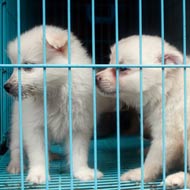Westminster to consult on dog breeding

The puppy farming industry is said to be worth around £100 million a year.
A new consultation will allow people to share their views on current puppy breeding legislation, George Eustice MP has announced.
The news, which has been welcomed by animal welfare campaigners, was first announced at a recent conference hosted by the All Party Parliamentary Group for Animal Welfare (AGPAW).
Mr Eustice also made an appearance on this week's Watchdog program and was questioned about the rising problem of puppy farming.
The puppy farming industry is said to be worth around £100 million a year, with tens of thousands of puppies expected to enter the UK in time for Christmas.
Ian Briggs from the RSPCA's special operations unit, said as many as one in three puppies in the UK are here because of the puppy farming trade.
Watchdog presenter Matt Allwright said the show had had an "incredible" response from the public, with many people getting in touch to report establishments they believe could be selling farmed puppies.
Asked what the government is doing to address these issues, Mr Eustice said: "We're about to launch a consultation actually on reviewing the whole licensing system for all animal establishments, including puppy breeding establishments."
One of the problems is illegal imports, he said, admitting that there is "an enforcement issue". The other is backstreet breeders in the UK, who currently fall outside of the licensing system. As the law stands in most parts of the UK, there is no limit to the number of dogs that can be bred at one location and puppies can be separated from their mothers as soon as they are weaned - as early as four weeks.
MP Rob Flello commented: "The issue with licensed and legal puppy farms is it shows really quite clearly how weak the legislation is. If you can meet the legal requirements whilst still running essentially a sort of battery caged outfit for dogs and puppies, again it just shows how weak the law is."
Mr Allwright raised concerns about Dogs Trust research which shows thousands of puppies are slipping through the cracks and entering the UK from Eastern Europe illegally. Mr Eustice said the government is working with other European countries to address the problem of vets in third countries issuing fraudulent passports. He also blamed internet puppy sales and consumers, saying: 'We need consumers to think much more carefully about where they're getting their animals from."



 The Veterinary Medicines Directorate (VMD) is inviting applications from veterinary students to attend a one-week extramural studies (EMS) placement in July 2026.
The Veterinary Medicines Directorate (VMD) is inviting applications from veterinary students to attend a one-week extramural studies (EMS) placement in July 2026.